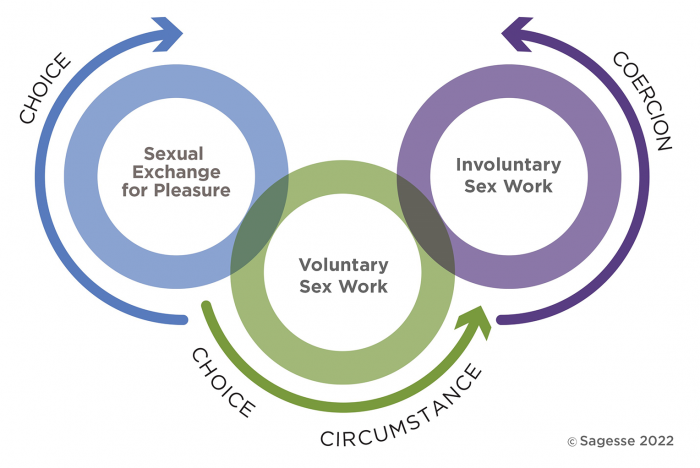At Sagesse, we define sex work as a material exchange for intimacy and/or sexual services. We believe there are many types of sex work, which can be sorted into two groups: voluntary sex work and involuntary sex work. Sex work can range from sexual exchange for pleasure, a material exchange for intimacy and/or sexual services, to sexual exploitation and human/sex trafficking.
We created this broad definition because sex work can be experienced in many different ways.

Voluntary sex workers, like most workers, have diverse feelings about their work. Sex work for some is a chosen profession that they enjoy and find rewarding, similar to any other profession. Some sex workers dislike their work but find that it is their best or only option to make a living. And some are agnostic about their work but find that it offers flexibility or good pay.
Involuntary sex work can take many forms, but the commonality with all of them is that the individual has been forced into the sex work and are experiencing sexual exploitation. Sexual exploitation can occur because someone is being forced into sex work by someone else (like an abusive partner) or they are forced into sex work because of things like addiction, homelessness, or mental health issues, or they are being trafficked.
Engagement in sex work is unique for each individual and only they can characterize their own experiences.
At Sagesse, we believe voluntary sex work is a valid form of work, and sex workers deserve workplace health and safety and human rights. We believe that involuntary sex work needs to be addressed through supports and services to provide protections to help sexually exploited individuals.
There are many myths that can impact perceptions of who sex workers are. This includes believing all sex workers are addicted, homeless, sexually deviant, sex trafficked, experienced sexual trauma or childhood sexual abuse, or conversely – wealthy high-end call girls.
These myths create boxes for people preventing them from living freely or having their experiences heard. Myths deny individuals who have experienced domestic abuse or engaged in sex work a fulsome identity, making these experiences seem like their only experiences. The resulting effect of this is an intense feeling of shame and otherness.
People who have engaged in sex work are rarely allowed space to be anything other than a “sex worker”. The experience of being stigmatized can become internalized, compounding the feelings of shame and otherness, leading to experiences of isolation, increased risks of abuse, and further complicated barriers to support.
Sex workers in many settings report experiences with abuse and coercive control in connection with their work. Since criminal laws apply to some activities associated with voluntary sex work, sex workers face an additional barrier to accessing services. They are afraid of accessing services or even talking to their peers about their experiences.
Domestic abuse and sex work each carry heavy amounts of social shame and stigma. Individuals with lived experience in both domestic abuse and sex work can internalize this compounding shame and stigma, which can lead to increased risks of isolation, lack of social supports, and barriers to accessing services.

At Sagesse we believe sex work is valid work and sex workers deserve workplace health and safety and human rights.
We would like to see sex work become both decriminalized and destigmatized. By removing the criminal and administrative penalties that apply specifically to sex work, the individuals involved will be more able to seek support and talk about their experiences in a way that protects their personal health and safety.
For decriminalization to be meaningful, it must be accompanied by a recognition of sex work as work, allowing sex work to be governed by labour law and protections similar to other jobs. While decriminalization does not resolve all challenges that sex workers face, it is a necessary condition to realize their human rights and separate their work from sexual exploitation.